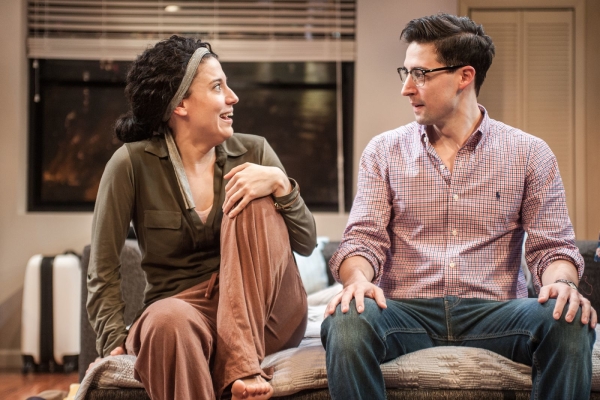Bad Jews

(© Teddy Wolff)
Joshua Harmon's bitingly funny Bad Jews, at Washington, D.C.'s Studio Theatre, is about family dysfunction so severe, it seems impossible that the characters involved are related. Yet they are. There's Daphna (Irine Sofia Lucio), an explosive, demanding, devout Jew who plans to move to Israel when she graduates from Vassar; her 25-year-old cousin Liam (Alex Mandell), who has cast off religion in favor of a secular interest in contemporary Japanese culture; and his brother, Jonah (Joe Paulik), who simply doesn't want to be caught between his two equally obnoxious relatives.
The play begins in Jonah's Upper West Side apartment, the day after his grandfather's funeral. Daphna tries to find out if Jonah wants their grandfather's cherished heirloom: his chai, the Hebrew word and symbol for "life," a small gold ornament their grandfather wore around his neck until his death. He kept it safe even during the Holocaust. From the way Daphna poses the question, it's clear that she feels she should have it, because she is such an observant Jew. Jonah, meanwhile, just wants to be kept out of the conversation.
Suddenly Liam arrives from Aspen with his girlfriend, Melody (Maggie Erwin), who just happens to be a Gentile. The question about the chai is momentarily tabled so that Daphna and Liam can hurl abuse at each other, letting loose feelings that have been welling up since high school. Daphna starts by going ballistic over the fact that Liam not only didn't make it to the funeral, but also that he didn't even call with a decent excuse.
At that point, the play lurches into a double diatribe between Liam and Daphna, with Jonah and Melody fading into the background. Given the way Harmon has written the play and Serge Seiden has directed it, Bad Jews veers precipitously away from a realistic analysis of faith and demonstrations of belief and toward an irrational demonstration of pure hate — an intense boxing match between cousins steeped in self-interest and greed.
In truth, Liam is no more likable than Daphna, and their real faults have less to do with religion than they do with common decency. Neither Daphna nor Liam can see the other's point of view, neither of them can compromise or empathize with anyone else. The meeting of the cousins grows increasingly savage, with Daphna hurling severe insults at Liam and his girlfriend, and Liam ultimately screaming – very loud – at Daphna.
Seiden has wound up his actors into a tight, well-coordinated ensemble. Lucio is onstage for almost the entire play. Her performance is delivered at a gallop but neither Daphna's viciousness nor her hilarious sarcasm is lost for a moment. Mandell is equally bold in his portrayal of Liam. He is humorless, self-righteous, and pompous and his egotism matches Daphna's. Paulik is charming as the quiet, reserved Jonah. Erwin is hilarious as the sweet, not-too-bright Melody, who tries to bring calm to the angry group by singing. Instead, she shouts a swoopy, unmelodic version of "Summertime."
Luciana Stecconi's set neatly captures the cramped quarters in which the battle is fought. A double sofa-bed is open. Two air mattresses cover the rest of the floor. A small, grimy window reveals city lights. Sound designer, Palmer Hefferan, creates an excellent reproduction of New York City noises. Kelsey Hunt's costumes are precise depictions of Harmon's diverse characters. In the first scene, Jonah sits on his mattress wearing boxer shorts, black socks and moccasins. Daphna wears no-nonsense sweatpants and sweatshirt throughout, making a loud statement that she intends to impress no one. Liam arrives in a suit and tie, carrying designer luggage. Melody's costume is the dream of certain high school princesses: a pink sweater, a pink bow in her long blond hair, a skirt printed with tiny flowers.
In order to be fully understood, Bad Jews needs to be considered as a satire, since Liam, Daphna, and Melody are drawn almost as caricatures, with all their weaknesses exposed and exaggerated. Yet as a satire, it shows that Harmon has a fully realized and (as Daphna would say) "intensely intense" sense of how the principles of argument and conflict serve as the basic elements of drama.










